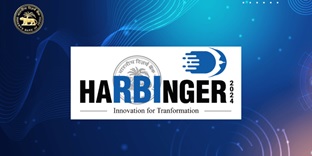08 December, 2025
RBI Launches Fourth Global Hackathon
Fri 24 Oct, 2025
Context:
The Reserve Bank of India (RBI) launched its fourth global hackathon, “HaRBInger 2025 – Innovation for Transformation”, on October 23, 2025.
Key Points:
- The event focuses on strengthening digital banking security, identity management, and inclusivity.
- RBI aims to promote the use of emerging technologies such as Blockchain, CBDC (Central Bank Digital Currency), and Artificial Intelligence (AI) to create user-centric financial solutions.
Background and Theme
- RBI began hosting annual global hackathons in 2021 as a platform to promote financial innovation.
- The HaRBInger series (derived from “Harbinger” – meaning a forerunner of change) invites global innovators to design solutions addressing Indian financial challenges.
| Edition | Launch Date | Theme | Focus Areas |
| HaRBInger 2021 | 2021 | Smart Digital Payments | Enhancing efficiency in digital transactions |
| HaRBInger 2023 | Feb 2023 | Inclusive Digital Services | Blockchain scalability, financial inclusion |
| HaRBInger 2024 | Jun 2024 | Zero Financial Frauds, Divyang-Friendly | Fraud detection, solutions for differently-abled users (Winners announced Jan 2025) |
| HaRBInger 2025 | Oct 23, 2025 | Secure Banking: Powered by Identity, Integrity, and Inclusivity | Tokenized KYC, Offline CBDC, Digital Trust |
Highlights of HaRBInger 2024
- The 2024 edition received 70 entries, out of which 28 teams developed prototypes.
- Winners received ₹40 lakh, while a special ₹20 lakh prize was awarded to an All-Women Team.
- The HaRBInger series aligns with Digital India and Aatmanirbhar Bharat, reflecting RBI’s vision of a technologically empowered financial ecosystem.
- By 2025, CBDC retail usage had grown 39 times compared to its launch phase.
Significance of the 2025 Theme
The 2025 theme — “Secure Banking: Powered by Identity, Integrity, and Inclusivity” — addresses critical challenges such as:
- Digital frauds, which resulted in losses exceeding ₹14,000 crore in 2024, and
- Identity theft and lack of trust in digital transactions.
It draws inspiration from global trends (like the EU’s Digital Identity Wallet) but emphasizes India’s inclusive context, focusing on rural and differently-abled users.
Problem Statements
The hackathon is structured around three core problem statements, promoting Blockchain, AI, and tokenization to enhance financial system security and trust:
1. Tokenized KYC:
Simplify the KYC process while safeguarding user identity.
- Example: Blockchain-based tokens to control data sharing and ensure privacy.
- Significance: India has over 1.4 billion KYC records; tokenization can reduce fraud by 30–50%.
2. Offline CBDC Usage:
Enable digital rupee (e₹) transactions without internet connectivity.
- Example: NFC-based tap-and-pay or QR code systems.
- Significance: Boosts financial inclusion in rural India, where 40% of the population lacks internet access. RBI’s recent offline e₹ pilot directly aligns with this challenge.
3. Building Digital Trust in Banking:
Enhance customer trust using AI/Blockchain, through fraud alerts and transparent transaction verification.
- Significance: The Digital Trust Index fell by 25% in 2025; this challenge promotes AI-driven, user-centric tools to restore confidence.
These problems are designed to produce practical prototypes that can integrate with RBI’s existing systems, such as the Digital Payments Intelligence Platform.
Participation and Process
- Eligibility: Open globally to individuals, teams (2–5 members), startups, and corporates.
Preference is given to participants familiar with Indian financial markets, though experts from all technical backgrounds (hardware/software developers) are welcome.
Process (3 Phases, similar to previous editions):
1. Entry Submission:
Register by November 15, 2025, at rbi.org.in/harbinger2025 with a brief solution concept.
2. Shortlisting & Mentorship:
Around 70–100 entries will be shortlisted; participants receive mentorship from FinTech leaders and RBI experts.
3. Grand Finale:
Scheduled for January 2026 (likely in Bengaluru). Teams present prototypes before an independent jury.
Awards:
- ₹40 lakh for each problem statement winner.
- ₹20 lakh special award for the Best All-Women Team.
- ₹5 lakh stipend for each shortlisted team to develop prototypes.


















